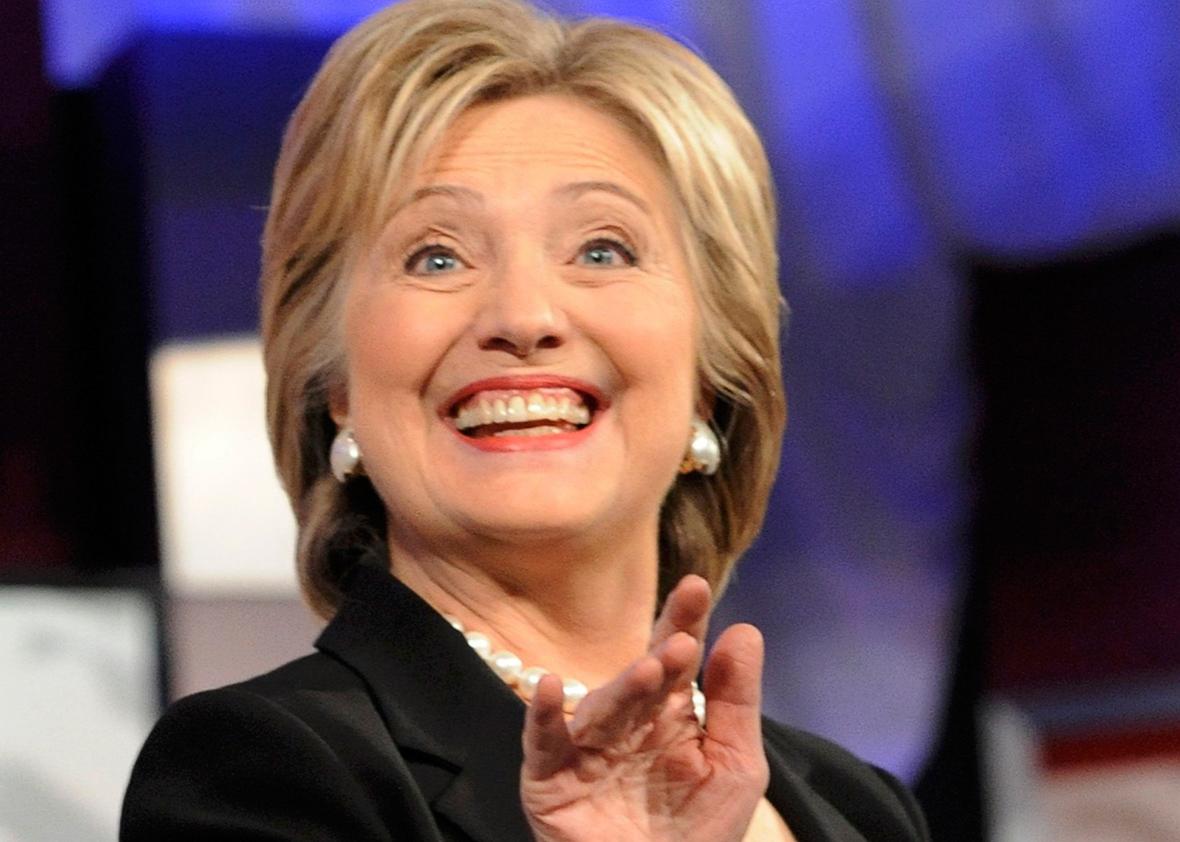One thing was clear from the early moments of Saturday night’s second Democratic primary debate: It wasn’t going to be the same easy glide that Hillary Clinton got in Las Vegas last month. Clinton’s two remaining competitors, Sen. Bernie Sanders and former Maryland Gov. Martin O’Malley, introduced themselves effectively to the country at large in October’s first debate. Saturday’s debate, moderated superbly by Slate political columnist and Face the Nation host John Dickerson, was the opportunity for Clinton’s challengers to take the assault more directly to Clinton in front of whatever portion of the country watches political debates on Saturday nights between 9 and 11 p.m.
Both Sanders and O’Malley, who each had strong nights, got their fair share of hits in. But for the most part, Clinton was able to parry them effectively enough, sometimes quite cynically. Neither rival was able to get the sort of clean licks in necessary to dislodge Clinton from her structural claw grip on the nomination.
Clinton and Sanders each had much to prove in the segment’s first quarter, which was devoted almost exclusively to terrorism and foreign policy in the wake of Friday night’s terrorist attacks in Paris. Clinton had the natural advantage: Polls show Democrats trust her more with national security issues than they do Sanders, even with her previous support for the Iraq War. Sanders has never demonstrated much interest in discussing foreign policy beyond reiterating that he voted against the Iraq War—something he mentioned quite a few times tonight.
Each was able to come out of this section well enough, though with a few dings. Sanders explained his foreign policy views in broad strokes, giving Clinton openings to show off her more granular knowledge of the issues. When Sanders mentioned that “Muslim nations in the region—Saudi Arabia, Iran, Turkey, Jordan” are “going to have to get their hands dirty, their boots on the ground” in the fight against ISIS in Syria, Clinton was ready with a retort: “I think that is very unfair to a few you mentioned, most particularly Jordan, which has put a lot on the line for the United States, has also taken in hundreds of thousands of refugees from Syria and has been therefore subjected to threats and attacks by extremists themselves.” Clinton’s knowledge of the issues, meanwhile, allowed her to filibuster through more difficult questions pertaining to her role in the toppling of Muammar Qaddafi in Libya and the mess it left. Clinton also managed the right tone in preserving her general election message. She distanced herself from President Obama’s heavily criticized comments about how ISIS is “contained,” arguing that “it cannot be contained, it must be defeated.” (How is still anyone’s guess, in either party.)
Sanders certainly perked up once the debate moved to domestic issues. (Yahoo! Politics reported earlier Saturday that the Sanders team was livid about CBS’s decision to extend and push forward the section about foreign policy. Based on his meh performance, it’s understandable why.) Sanders, with some help from O’Malley, hit Clinton hard on her connections to and donations from Wall Street. Clinton explained that she has a tough plan to regulate Wall Street—a claim lambasted as “not good enough” by Sanders and “weak tea” by O’Malley. “Why, over her political career, has Wall Street been a major—the major campaign contributor to Hillary Clinton?” Sanders said. “Now, maybe they’re dumb and they don’t know what they’re going to get, but I don’t think so.” Sanders also had, perhaps, the best red-meat line of the night during this portion: “The business model of Wall Street is fraud.”
Clinton responded to this with perhaps her most cynical moment of the campaign so far. “Not only do I have hundreds of thousands of donors, most of them small,” she said. “I’m very proud that for the first time a majority of my donors are women, 60 percent.” That pander got applause. As did the following one: “I represented New York, and I represented New York on 9/11 when we were attacked. Where were we attacked? We were attacked in downtown Manhattan where Wall Street is. I did spend a whole lot of time and effort helping them rebuild. That was good for New York.”
Good grief. But it got her reasonably off the hook. And she was able to escape well enough later again when a tweet was read aloud calling her out on it, even managing to garner applause.
From then on, Clinton kept the ship steady. Sanders gave her yet another pass on her email issue, saying that he hasn’t changed his mind since the first debate. “I was sick and tired of Hillary Clinton’s email,” Sanders said. “I am still sick and tired of Hillary Clinton’s emails.” Clinton then, returned the favor, in the gently condescending voice of a winner: “And I give Sen. Sanders a lot of credit for really lighting a fire under many people—young, old, everybody—who sees a chance to be involved and have their voice heard.” When Dickerson followed up about the emails, Clinton was able to work in the reference to her marathon Benghazi Committee hearing that she’s been trying out on the trail:
DICKERSON: Secretary Clinton, just one more question on the email question for Democrats. There’s an F.B.I. Investigation going on. Can you satisfy Democrats who might worry about another shoe dropping that you and your staff have been totally truthful to them and that another shoe is not going to drop?
CLINTON: I think after 11 hours, that’s pretty clear, yes.
Clinton went in the debate needing to avoid the clean, vicious hit that people would be talking about for weeks or months. She accomplished that, even if she had to dig deep into the pander bag a time or two.
